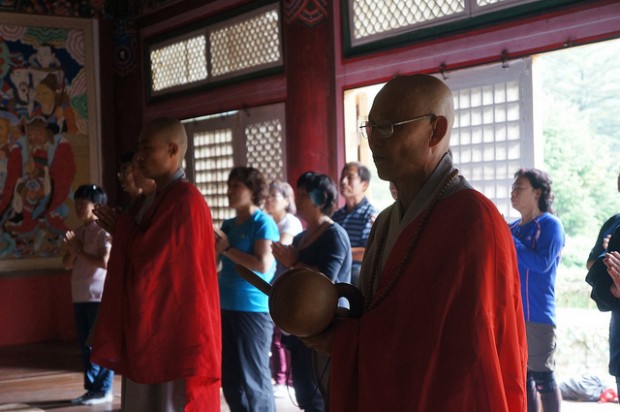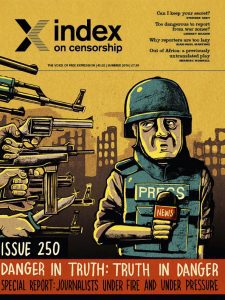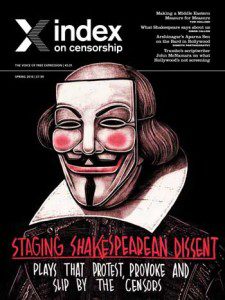14 Apr 2016 | Asia and Pacific, Burma, China, Eritrea, Europe and Central Asia, Iran, Middle East and North Africa, mobile, News and features, North Korea, Saudi Arabia, Sudan, Turkmenistan, Uzbekistan
[vc_row][vc_column][vc_column_text]

Pohyon Temple in the Myohyang mountains, once a national center for Korean Buddhism. Credit: Uri Tours / Flickr
After the United States Commission on International Religious Freedom, an independent organisation created by the US Congress to evaluate religious freedom conditions around the world, released its 2015 report, it became clear that an insufficient amount of progress had been made since Index on Censorship last reported on the issue.
Here’s a roundup of some the most appalling religious freedom violations from across the globe.
Burma
Bigotry and intolerance continue to scorch the lives of religious and ethnic minorities in Burma, particularly Rohingya Muslims. The Burmese government demonstrated little effort toward intervening or properly investigating claims of abuse, including those carried out by religious figures in the Buddhist community. As internet availability spread throughout the country, social media played a role in promoting a platform of hate and proposed violence against minority populations. Rohingya Muslims in the country face a unique level of discrimination and persecution. The government denies them citizenship and the right to identify as Rohingya. Additionally, four discriminatory race and religion bills could further the prejudices affecting religious minorities.
North Korea
North Korea is a nation where genuine freedom of religion or belief is non-existent; it remains one of the most oppressive regimes and worst violators of human rights. Punishment comes to those who pose difficult questions while the government maintains its control through a constant threat of imprisonment, torture and even death for those who break the law regarding religion. Estimates suggest up to 200,000 North Koreans are currently suffering in labor camps, tens of thousands of whom are there for practicing heir faith. In February 2014, the Commission of Inquiry on Human Rights in the Democratic People’s Republic of Korea released its report documenting the systematic, severe violations of human rights in the country. It found “an almost complete denial of the right to freedom of thought, conscience”.
Saudi Arabia
Officially an Islamic state with eight to ten million expatriate workers of different faiths, Saudi Arabia continues to restrict most forms of public religious expression inconsistent with its interpretation of Sunni Islam. The government continues to use criminal charges of blasphemy to suppress any dialogue between dissenting viewpoints, with a new law helping drive home the goal of silence. The Penal Law for Crimes of Terrorism and its Financing criminalises virtually all forms of peaceful dissent and free expression, including criticising the government’s view of Islam. Lastly, authorities continue to discriminate grossly against dissident clerics and members of the Shia community.
Sudan
The Sudanese government continues to engage in massive violations of freedom of religion, due to president Omar al-Bashir’s policies of Islamisation and restrictive interpretation of sharia law. Despite 97% of the population being Muslim, there is a wide range of other religions practiced. The country’s turmoil from religious persecution rests on the 1991 Criminal Code, the 1991 Personal Status Law of Muslims, and state-level “public order” laws, which have restricted freedom for all Sudanese. The laws – which contradict the country’s constitutional and international commitments to human rights and freedom of religion – allow death sentences for apostasy, stoning for adultery, cross-amputations for theft, prison sentences for blasphemy and floggings for undefined “offences of honor, reputation and public morality”. Since 2011, more than 170 people have been arrested and charged with apostasy.
Article continues below
[/vc_column_text][/vc_column][/vc_row][vc_row][vc_column][vc_custom_heading text=”Join the Index mailing list and get an exclusive gift” font_container=”tag:p|font_size:28|text_align:left” use_theme_fonts=”yes”][vc_separator color=”black”][/vc_column][/vc_row][vc_row][vc_column width=”1/2″][vc_column_text]

Index on Censorship’s summer magazine 2016
We’ll send you our weekly emails and periodic updates on our events. We won’t share your personal information with anyone outside Index.
You’ll also get access to an exclusive collection of articles from our landmark 250th issue of Index on Censorship magazine exploring journalists under fire and under pressure. Your downloadable PDF will include reports from Lindsey Hilsum, Laura Silvia Battaglia and Hazza Al-Adnan.[/vc_column_text][/vc_column][vc_column width=”1/2″][gravityform id=”20″ title=”false” description=”false” ajax=”false”][/vc_column][/vc_row][vc_row][vc_column][vc_separator color=”black”][/vc_column][/vc_row][vc_row][vc_column][vc_column_text]Uzbekistan
In Uzbekistan, the government imprisons individuals for not conforming to officially prescribed practices or whom it claims are extremist, including as many as 12,000 Muslims. A highly restrictive religion law is imposed, the 1998 Law on Freedom of Consciences and Religious Organisations, which severely limits the rights of all religious groups and facilitates Uzbek government control over religious activity. Many who don’t fit into the framework of officially approved practices are regularly repressed. Additionally, the government has continued a campaign against independent Muslims, targeting those linked to the May 2005 protests in Andijan; 231 are still imprisoned in connection to the events, and ten have died. All the while, Uzbekistan has pressured countries to return Uzbek refugees who fled during the Andijan tragedy.
Turkmenistan
In an environment of nearly inescapable government information control, severe religion freedom breaches persist in Turkmenistan. Continuing police raids and harassment of registered and unregistered religious groups matched with laws and policies that violate international human rights norms has the nation as one of the year’s biggest offenders. With an estimated total population of 5.1 million, the US government projects that the country is 85% Sunni Muslim, 9% Russian Orthodox, and a 2% total that includes Jehovah’s Witnesses, Jews, and evangelical Christians. Despite Turkmenistan’s constitutionally guaranteed religious freedom and separation of religion from the state, the 2003 religion law negates these provisions while setting intrusive registration criteria for individuals. It also requires that the government is informed of all foreign financial support, forbids worship in private homes and places discriminatory restrictions on religious education.
China
While the Chinese constitution guarantees freedom of religion, this idea really only applies to “normal religions”, better known as the five state-sanctioned “patriotic religious associations” associated with Buddhism, Taoism, Islam, Catholicism and Protestantism. Even still, the government monitors religious activities unfairly, and there has been an increased religious persecution of Uighur Muslims in the name of fighting terrorism. All around repression in China worsened in 2014, including the governmental push for controlling Tibet, Xinjiang, and even Hong Kong, as well as controls on the internet, social media, human rights defenders, activists and journalists.
Eritrea
Ongoing religious freedom abuses have continued in Eritrea, including torture or ill-treatment of religious prisoners, random arrests without charges and banning’s on public religious activities. The situation is especially serious for Evangelical and Pentecostal Christians and Jehovah’s Witnesses, and the government suppresses Muslim religious activities and those opposed to the government-appointed head of the community. In 2002, the government increased its control over religion by imposing a registration requirement on all religious groups other than the Coptic Orthodox Church of Eritrea, Sunni Islam, the Roman Catholic Church and the Evangelical Church of Eritrea. The requirements mandated that the non-preferred religious communities provide detailed information about their finances, membership, activities, and benefit to the country. Additionally, released religious prisoners have reported to USCIRF that they were confined in crowded conditions, and subjected to extreme temperature fluctuations. The government continued to arrest and detain followers of unregistered religious communities. Recent estimates suggest 1,200 to 3,000 people are imprisoned on religious grounds in Eritrea, the majority of whom are Evangelical or Pentecostal Christians.
Iran
Poor religious freedom in Iran continued to worsen in 2014, particularly for minority groups like Bahá’ís, Christian converts, and Sunni Muslims. The government is still engaging in systematic violations, including prolonged detention, torture, and executions based on the religion of the accused. Despite Christians, Jews, and Zoroastrians being recognised as protected minorities, the government has consistently discriminated against its citizens on the basis of religion. Killings, arrests, and physical abuse of detainees have increased in recent years, including for religious minorities and Muslims who are perceived as threatening the government’s legitimacy.[/vc_column_text][/vc_column][/vc_row][vc_row][vc_column][vc_basic_grid post_type=”post” max_items=”12″ style=”load-more” items_per_page=”4″ element_width=”6″ grid_id=”vc_gid:1493906845781-a7b9ac80-f77d-2″ taxonomies=”1742″][/vc_column][/vc_row]
8 Apr 2016 | Magazine, mobile, Student Reading Lists

Order your copy of the Staging Shakesearean dissent here.
Order your copy of Index on Censorship here
To mark the release of the spring 2016 issue of Index on Censorship magazine Index has compiled a reading list of articles from the magazine archives covering the censorship of theatre. The latest issue, Staging Shakespearean Dissent, takes a look at how Shakespeare’s plays have allowed directors to tackle issues that would have otherwise been censored in countries around the world.
Egoli — City of Gold
August 1982 vol. 11 no. 4
Performances of South African play Egoli, by writer Matsemela Manaka, went ahead at a Johannesburg theatre without being censored, yet the printed version – an extract of which is featured in this article – was banned. Egoli, which means “city of gold”, focuses on the plight of migrant mine workers in South Africa. Its two characters, John Moalusi Ledwaba and Hamilton Mahonga Silwane, were in prison at the same time: one for a political crime, the other for rape and murder. Now they work in the gold mines, while their families attempt to farm in the “homelands”.
Read the full article here.
Knife edge
March 2015 vol. 44 no. 1
Lucien Bourjeily’s 2013 play Will It Pass or Not? was banned by Lebanon’s censorship bureau, yet his 2015 play For Your Eyes Only, Sir was approved after some minor changes, despite the play including scenes from its banned prequel. Aimée Hamilton talks to Bourjeily about why his new play escaped the censors when his previous one didn’t, and what inspired it; and For Your Eyes Only, Sir is translated into English for the first time for Index on Censorship magazine.
Read the full article here.
Oh! How I miss the termite
July 1979 vol. 8 no. 4
Despite government assurances that it was lifting restrictions on Brazilian stage productions in April 1979, theatres were among the most censored over the next decade. Every play had to be submitted to the censor in Brasilia before it was staged, and a complete rehearsal had to take place in the presence of a censor of the town in which the play was being performed. In December 1978 one of Brazil’s best know playwrights Plínio Marcos, notorious for having 18 of his works suppressed without performance, wrote the play Oh! How I Miss the Termite to be read only, believing he could not get the play performed publicly.
Read the full article here.
My Temptation
November 1986 vol. 15 no. 10
In an interview with Czech exile Karel Hvizdala, for inclusion in a book of interviews he was working on, Czechoslovakian playwright Vaclav Havel, who was unable work in his profession in his own country – where nothing he had written had been published or performed since 1969 – speaks about his latest plays Largo Desolato and Temptation.
Read the full article here.
A censored life
February 1985 vol. 14 no. 1
Karel Kyncl tells the story theatre and film actress Vlasta Chramostová, her Living Room Theatre, and how Shakespeare was used as a form of resistance. In the 1960s and 70s Czechoslovakian actors put on performances of Macbeth in houses, which they called Living Room Theatre. However, Shakespeare was seen as an enemy of socialism by Czechoslovakia police, who began to harass the actors. The actors continued to perform despite pressure from the police but eventually some of these actors were driven into exile.
Read the full article here.
Shame in Birmingham
May 2005 vol. 34 no. 2
Janet Steel discusses the censorship Gurpreet Kaur Bhatti faced when the British-Pakistani playwright attempted to put on her production Behzti at the Birmingham Repertory Theatre. The local Sikh community called for the play to be banned, stating it incited racial hatred, which led to Bhatti receiving threats because of her work.
Read the full article here.
Nan Levinson: Bowdler revisited
March 1990 vol. 19 no. 3
Nan Levinson discusses censorship of Romeo and Juliet in textbooks in American schools. Artist Janet Zweig read an article written by a student about the discrepancies between the play in his school textbook and the version he saw on stage. Over 300 lines had been cut from the play, the majority of which contained sexual references. Zweig spoke to publishers and found the publishers that didn’t cut lines from the textbook didn’t sell as many as those who did. She went on to make a book from the 336 lines that were cut from the textbooks, part of which is featured in this article.
Read the full article here.
Dame Janet Suzman: Stage directions in South Africa – June 2014 vol. 43 no.2
Dame Janet Suzman’s 1987 production of Othello in South Africa caused a huge amount controversy due the production showing a relationship between a black man and a white woman during the apartheid. Many people left the production in protest and sent threatening letters, however the play escaped being banned or censored because it was Shakespeare. In this article Suzman discusses why she chose to put on such a controversial production and how through Shakespeare they escaped the censors.
Read the full article here.
The fate of Tang Xianzu
November 1998 vol. 27 no. 6
The long awaited revival of a 400-year-old classical opera, in rehearsal at Shanghai’s Kunju Theatre, was called off by the Shanghai Bureau of Culture. It accused the director of introducing “archaic, superstitious and pornographic” elements into his production and vetoed its export first to New York and subsequently to France, Australia and Hong Kong. Mu Dan Ting, (Peony Pavilion), had not been performed in its entire act since it was written by Tang Xianzu in 1598 during the Ming Dynasty, as it was written out of classical repertoire under the communists. However director Yang Lian believes this time round its banning has more to do with political manoeuvering than the nature of the opera itself.
Read the full article here.
Theatre Censorship
August 1980 vol. 9 no. 4 23-28
“Censorship in the theatre has always been more petty and strict than censorship in general – that of literature, for instance. Sadly, it has often been the finest examples of Russian drama that have not reached the stage until several years – sometimes decades – after they were written.” Anna Tamarchenko discusses the censorship of Russian theatre throughout the years.
Read the full article here.
Order your copy of Index on Censorship here or take out a digital subscription via Exact Editions (just £18 for the year, with a free trial).



